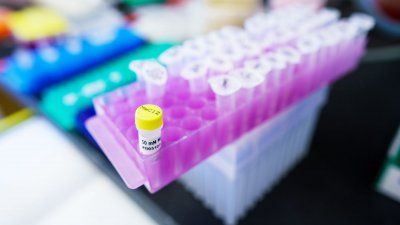First Clear-Cut Risk Genes for Tourette Disorder Revealed
Researchers made a significant advance, identifying the first “high-confidence” risk gene for Tourette disorder as well as three other probable risk genes.

University of California San Francisco
Give to UCSFResearchers made a significant advance, identifying the first “high-confidence” risk gene for Tourette disorder as well as three other probable risk genes.

Young adults get more pleasure from smoking cigarettes while they are drinking alcohol than they do while using marijuana, according to a new UC San Francisco study.

A new trial may hold new hope for military personnel with PTSD and alcohol abuse through treatment with oxytocin, sometimes referred to as the “love hormone.”

In a major advance for fundamental biological research, UCSF scientists have developed a tool capable of illuminating previously inscrutable cellular signaling networks.

UCSF has worked strategically with community partners in the SFHIP to enact high-impact policies, such as banning sugar-sweetened beverages from hospitals, to improve public health and reduce health inequities in the city.

Distinct sets of genetic defects in a single neuronal protein can lead either to infantile epilepsy or to autism spectrum disorders.

Alcohol consumed during just seven weeks of intermittent binge drinking harms the liver in ways that more moderate daily drinking does not.

People with bipolar disorder, schizophrenia and major depression with psychosis may be up to 15 more likely than the general population to be HIV positive, but are only marginally more likely to be tested for the virus.

To give you a bit of scientific motivation, UCSF gathered some of the latest research behind the most popular health-related New Year’s resolutions that attest to why it really is good for your body to see them through.

Killing in war often triggers a moral conflict in veterans that can damage their self-image, relationships and spirituality.

Ricardo F. Muñoz, professor emeritus of psychology at UCSF, has been named a Fellow of the American Association for the Advancement of Science.

The UCSF Weill Institute for Neurosciences has named the first recipients of the UCSF Weill Innovation and Scholar Awards as part of the institute’s goal to support high-risk, high-reward research.

UCSF has ranked as one of the top 20 universities in the world, according to the 2017 Best Global Universities rankings released Tuesday by U.S. News & World Report.

Research led by UCSF scientists has revealed that mutations in a gene linked with brain development may dispose people to multiple forms of psychiatric disease by changing the way brain cells communicate.

Years of research have shown that trauma and adverse events in childhood can put a person at an elevated risk for a wide range of physical and mental health problems across their life span. But the scope and significance of that impact – and how to reverse it – is just beginning to come into focus.

Persistent poverty in young adulthood and midlife may elevate one’s risk for lower cognitive function by age 50.

A new analysis of marijuana legislation offers a framework for states that are considering legalizing the drug and want to protect public health, rather than corporate profits.

Mothers who were raising children with autism and reported chronic stress were more likely to have high levels of “bad” cholesterol and lower levels of protective progenitor cells.

A new UCSF report on an understudied population – older homeless adults – reveals that adverse childhood experiences have long-lasting effects.
